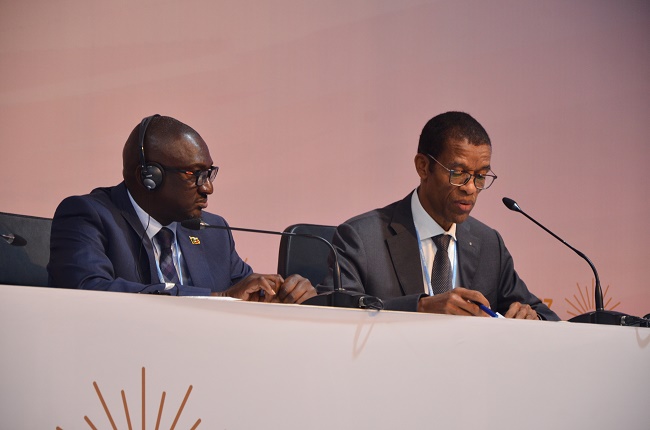“Developed nations are not just leaving Africa behind in the Global Goal for Adaptation to Climate Change, they are flying too far away from their own commitments, they are going the wrong direction COP by COP,” says the African Group of Negotiators in a statement released a few hours to the end of negotiations at the 27th Session of the Conference of the Parties (COP27) to the United Nations Framework Convention on Climate Change (UNFCCC).

“That means more devastation for Africa. We now understand that some of the commitments are not being met because of geopolitical reasons. Because we believe the developed countries have the means for adaptation. Some of our Nationally Determined Contributions (NDCs) need support,” says Alioune Ndoye, the President of the African Ministerial Conference on the Environment (AMCEN), who is also Minister of the Environment, Sustainable Development and Ecological Transition of Senegal, while speaking to the press on behalf of the Chair of the African Group of Negotiators.
The group has indicated that developed countries are backtracking on their own commitments on the global adaption goal of providing $100 billion for adaptation per year for developing countries by 2020. The facility remains on paper with no actual delivery.
Ndoye says real progress for Africa from COP27 is in “the implementation of the several commitments that have been agreed on adaptation finance, mitigation, loss and damage, Finance and mitigation ambitions”.
The world is working with 70 percent chance of limiting the net global temperature rise to 1.5 degrees Celsius if and only if all the updated nationally determined contributions are fully implemented.
The African group says without financing, planet earth risks being left with 40 percent chance, and effectively putting the temperature rise to about 2.5 degrees Celsius above pre-industrial era (1850 -1900).
Decisions Must be Reached at COP27
On Tuesday, the African group addressed the media, stating that they are very concerned about the “lack of progress on various issues of importance to the group particularly on finance, adaptation and loss and damage.” The group stated that, with few days left to the end of COP27, the continent is walking a tight rope to reach consensus on adaptation, loss and damage, mitigation and means of implementation.
“We note that intensive technical work was undertaken throughout the year and last week on the Global Goal on Adaptation. We call on all Parties to work constructively for reaching an agreement on a framework to enable the achieving and assessing progress towards the Global Goal on Adaptation,” the statement read to the press states.
The Sixth Assessment Report (AR6) of the Intergovernmental Panel on Climate Change (IPCC) found that Africa will be impacted more than any other continent despite the continent only contributing less than 4% of the world’s total emissions.
The report estimates that adaptation costs in developing countries will reach $127 billion, and Africa needs up to $86.5 billion annually by 2030. In a continent that is already food insecure, Africa has suffered a 34% decline in food production and loss & damage to agricultural productivity, according to the Sixth Assessment Report (AR6) of the Intergovernmental Panel on Climate Change (IPCC) otherwise known as the IPCC AR6.
It is now a matter of hours for Africa to find out whether COP27 has delivered on the key thematic areas by increasing ambitions from the developed nations.
Firing Up Coal Power Plants
There is also fear among the African Group of Negotiators that developed nations will fire back some of their decommissioned coal plants as the world reels in new energy crisis triggered by Russian invasion of Ukraine.
Alioune Ndoye says: “This is why the African Group is urging the developed countries to move quickly to renewable energy. They have the means and the technical capacity. And they must also come to Africa for the continent to effectively contribute to the 1.5 degrees Celsius temperature goal.”
Collins Nzovu, the Zambian Minister of Green Economy and Environment, told the press that “we expect COP27 to result in tangible outcomes which reflect people’s aspirations, including Africa’s special needs and special circumstances.”
Earlier, the Pan African Climate Justice Alliance (PACJA), Africa’s main Civil Society Coalition, stated that the first week of talks ended up in frustrations without tangible outcome for Africa following the dropping of the agenda on the “Continent’s Special Needs and Circumstances.”
PACJA executive director, Dr. Mithika Mwenda, urged the Africa negotiators at COP27 not to relent in putting forward Africa’s interests because, according to him, “this is a fight for our livelihoods and for our lives”.
Later that week, Kenya’s President William Ruto, who attended the Conference of Parties as his first as head of state, spoke on behalf of Africa, calling on the West – widely considered the most responsible for the highest greenhouse gas emissions – to act right and pay up.
In the background, Kenya then signed a deal related to green energy with the UK of about KES500 billion.
Courtesy: PAMACC News Agency
